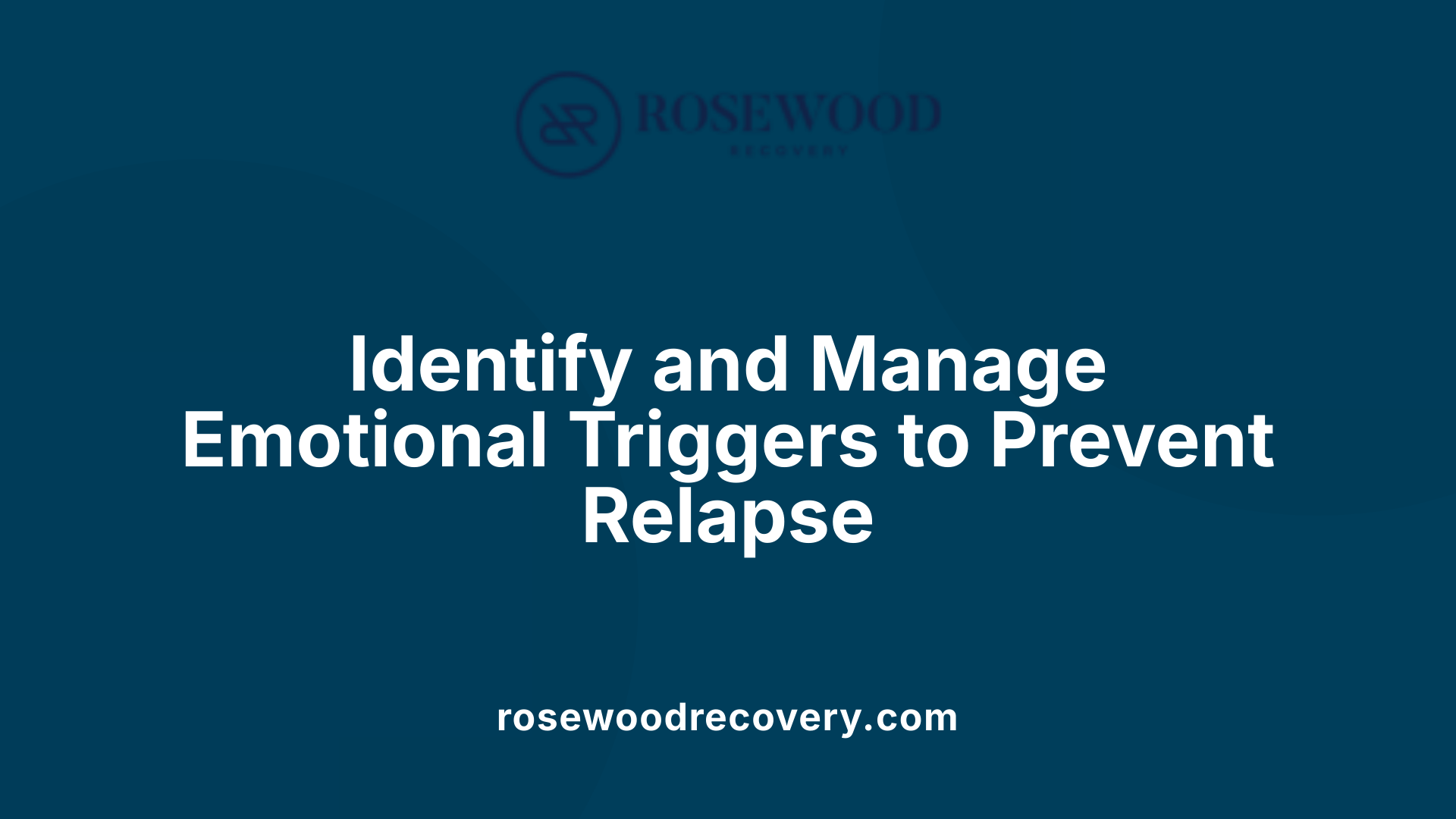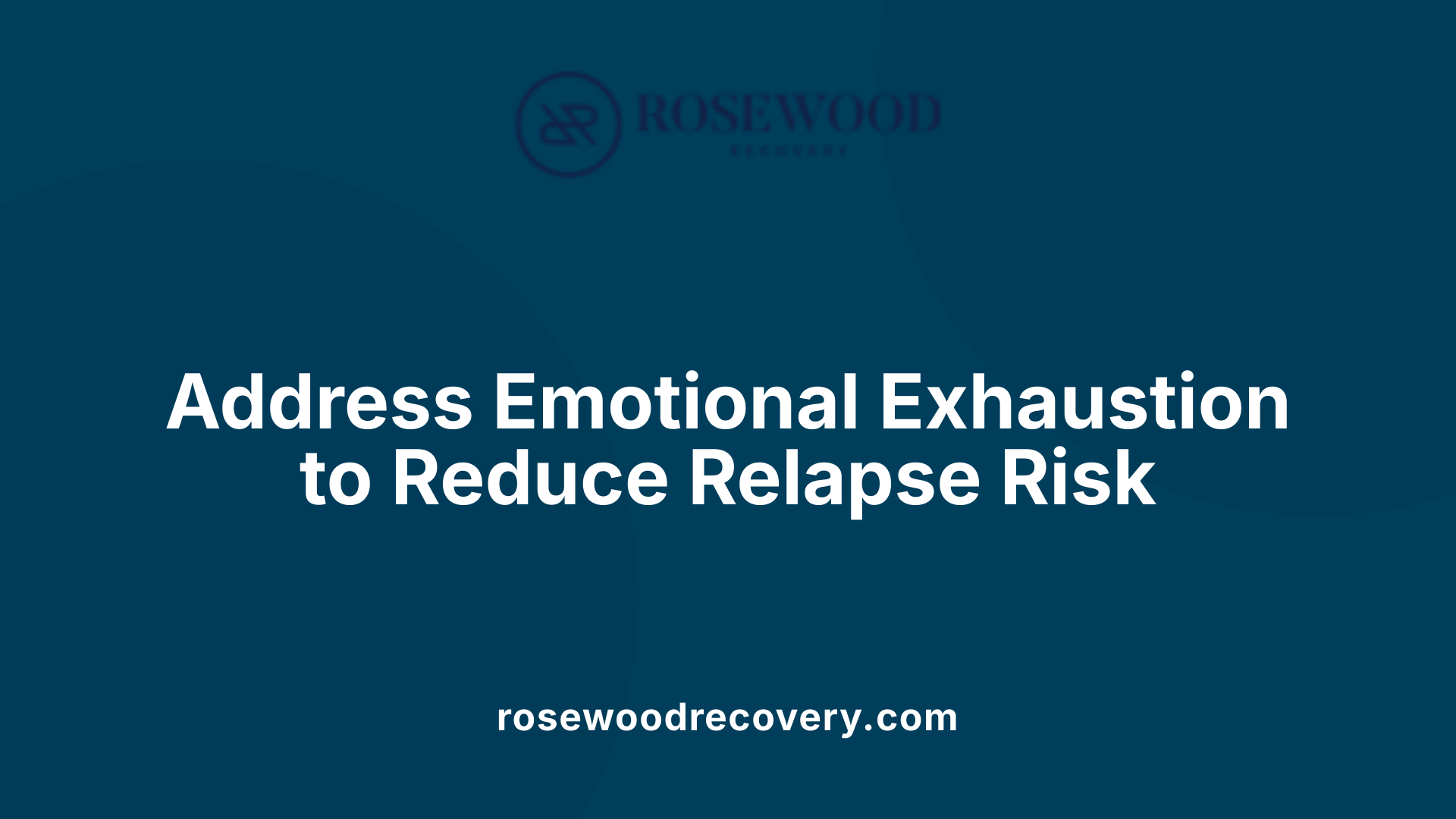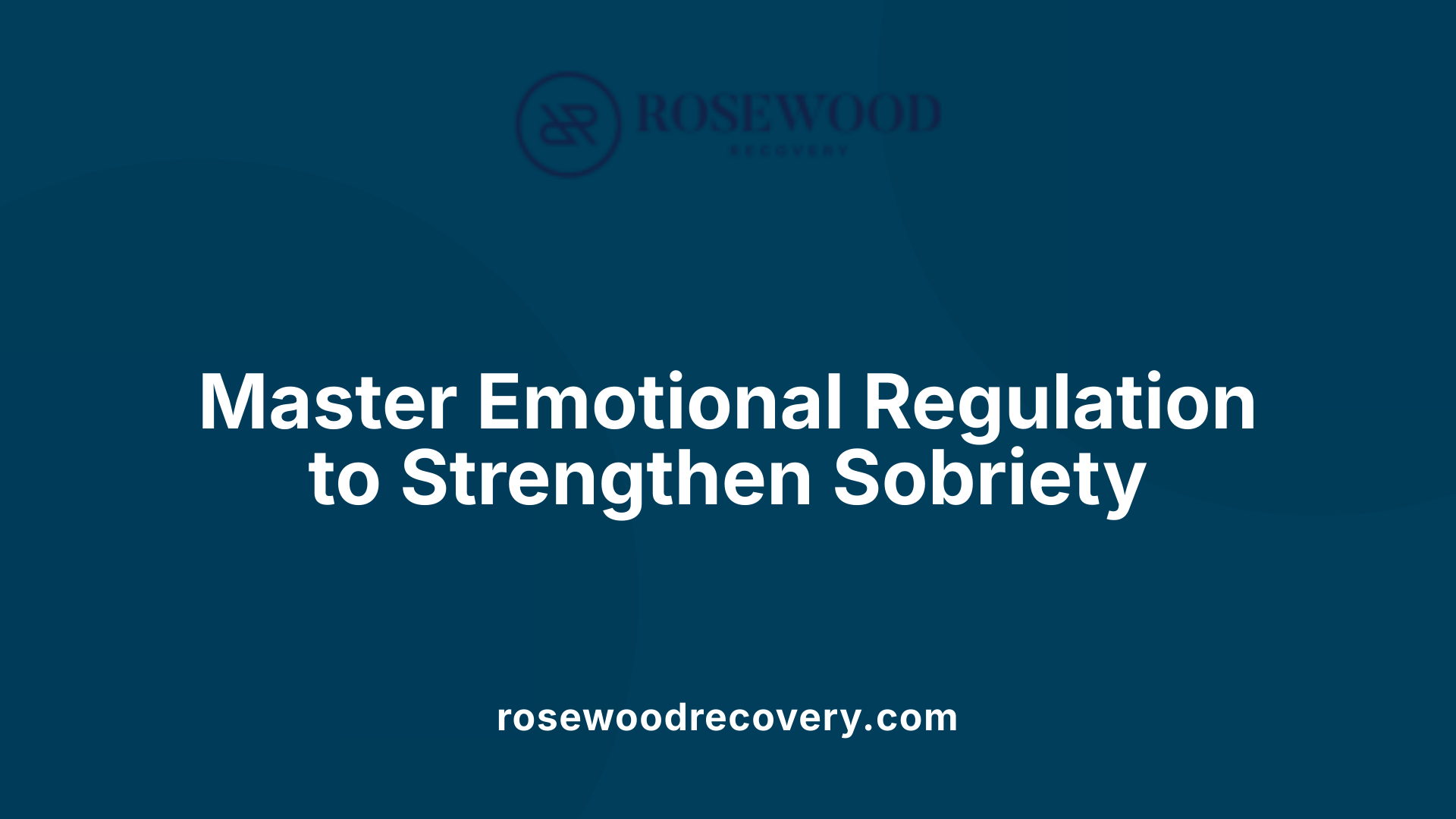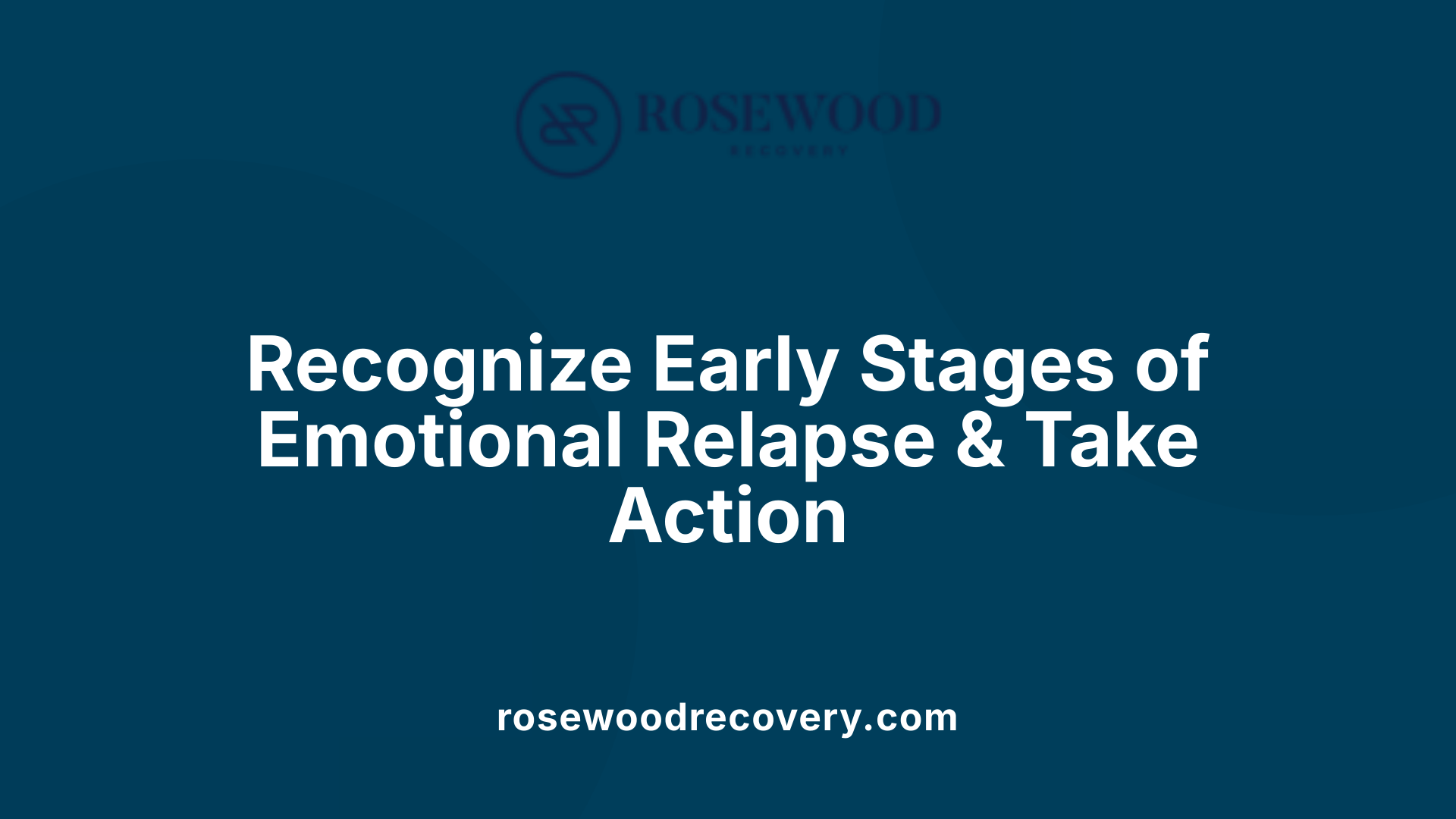Understanding Emotional Exhaustion and Its Hidden Danger
Emotional exhaustion, often unnoticed, acts as a stealthy precursor to relapse among individuals in recovery. While many focus on environmental cues or physical triggers, the internal emotional landscape can silently erode resilience. Recognizing the subtleties of emotional fatigue and its neurobiological implications is vital to safeguarding long-term sobriety. This article explores how emotional exhaustion contributes to relapse risks, signs to watch for, and effective strategies to manage and prevent this hidden hazard.
Understanding Emotional Triggers in Recovery

What are common emotional triggers that increase the risk of relapse?
In recovery, recognizing emotional triggers is vital to maintaining sobriety. Common emotional triggers include heightened stress, feelings of sadness or depression, anger, loneliness, and boredom. These emotions can create a silent pull toward substance use as a way to cope.
Internal emotional states such as hunger, anger, loneliness, and tiredness—known as HALT—are particularly powerful. When these states occur, judgment and resilience often weaken, making negative emotions more intense and harder to manage.
Environmental and social cues also play a role. Being in locations associated with past substance use or around people who use drugs or alcohol can activate cravings. Social situations like parties or stressful workplace environments might serve as reminders of those previous habits.
Furthermore, emotional relapse can stem from unexpressed feelings, social withdrawal, and neglecting self-care routines. Bottling up emotions or avoiding emotional conversations can build internal pressure, eventually leading to a critical point.
To prevent relapse, individuals need to identify these triggers early and employ strategies such as mindfulness, establishing strong support networks, and practicing self-awareness. Recognizing how specific emotions and situations influence cravings allows for more effective coping, reducing the risk of falling back into old patterns.
The Role of Emotional Exhaustion in Relapse Susceptibility

How does emotional exhaustion contribute to the risk of relapse?
Emotional exhaustion plays a significant role in increasing the likelihood of relapse among individuals in recovery. When someone is emotionally drained, their judgment and decision-making abilities become impaired, making them more susceptible to triggers such as cravings, negative emotions, or stressful situations.
The state of being emotionally fatigued affects brain systems responsible for managing stress and emotional responses. For example, chronic emotional fatigue disrupts neurobiological systems like the corticotropin-releasing factor (CRF) and noradrenergic pathways, which are active in limbic brain regions that control stress and mood regulation.
These disruptions lead to heightened reactivity to stressors and alcohol or drug-related cues. In addition, previous drug exposure and ongoing stress can cause neuroplastic changes—alterations in neural circuits involving dopamine and glutamate—which persist over time. Such changes increase sensitivity to relapse triggers, making relapse more likely when faced with stress or environmental cues.
Neurobiological effects of emotional exhaustion diminish resilience, impair coping mechanisms, and promote maladaptive behaviors. This cycle feeds into a heightened vulnerability where negative emotions and stress become overwhelming, pushing the individual toward substance use as a maladaptive relief.
In high-stress environments or situations with abundant cues, these neurobiological and emotional factors interact, significantly boosting relapse risk. Recognizing and addressing emotional exhaustion, through stress management and emotional regulation strategies, is crucial for maintaining sobriety and reducing the chances of relapse.
Early Warning Signs of Emotional Burnout and Their Link to Relapse
What are the warning signs of emotional burnout that may precede relapse?
Emotional burnout is a significant precursor to relapse, often signaling that emotional resilience is declining. Individuals experiencing burnout commonly report persistent feelings of fatigue and emotional emptiness that do not improve with rest. These feelings of exhaustion can be mental, physical, or both, leading to a sense of being overwhelmed.
Mood swings and irritability tend to increase, which can strain relationships and reduce motivation to stay committed to recovery routines. Many individuals begin to detach from activities they once found fulfilling, such as social gatherings, hobbies, or support groups, creating a sense of isolation. Feelings of cynicism or hopelessness may emerge, further eroding optimism and confidence in the recovery process.
Behavioral changes are also critical indicators. A person might start avoiding responsibilities or withdrawing from family and friends, often masking their struggles with distractions like excessive screen time or unhealthy coping mechanisms. This avoidance can lead to minimizing or denying ongoing issues, making it harder to seek help proactively.
Physiologically, emotional burnout manifests through various physical symptoms. Headaches, muscle pain, digestive disturbances, and sleep problems—such as insomnia or oversleeping—are common. These physical signs often go unnoticed as related to emotional health, but they can signal the need for immediate intervention.
Recognizing these early emotional and physical signals is crucial. Interventions like reconnecting with support networks, engaging in self-care routines, or seeking professional help can help manage burnout. Addressing emotional exhaustion promptly reduces the risk of it escalating into mental or physical relapse, thus supporting sustained recovery.
Strategies to Manage Stress and Emotional Fatigue

What strategies can help manage stress and emotional fatigue to prevent relapse?
Managing stress and emotional exhaustion is essential for maintaining sobriety. Several proven strategies can help individuals handle these challenges effectively.
One of the most widely recommended methods involves practicing mindfulness and meditation. These techniques focus on being present in the moment, which can lower anxiety levels and foster a calm mental state. Physical exercise is also highly beneficial, as it releases endorphins that improve mood and reduce stress.
Building a strong social support system is crucial. Regular interactions with supportive friends, family, or peers in recovery groups such as Alcoholics Anonymous or SMART Recovery provide emotional comfort and accountability. Seeking professional counseling can offer personalized coping mechanisms and address underlying emotional issues, such as anxiety or depression.
Maintaining routine stability is another vital aspect. Establishing daily routines, setting realistic goals, and creating healthy boundaries help reduce feelings of chaos and overwhelm. Techniques like deep breathing, progressive muscle relaxation, and journaling are effective in managing immediate stress responses.
Addressing high-risk situations with cognitive-behavioral relapse prevention strategies can also reinforce resilience. Recognizing personal triggers — such as certain environments, emotions, or social cues — allows individuals to prepared responses.
Finally, utilizing accessible resources like national helplines and educational materials can connect individuals with local support services, further strengthening their ability to cope with stress and prevent relapse. Integrating these approaches fosters a comprehensive, resilient mindset essential for long-term recovery.
The Vital Role of Emotional Regulation in Relapse Prevention

How important is emotional regulation in relapse prevention?
Managing emotions effectively is a cornerstone of staying sober in recovery. Emotional regulation refers to the ability to control and respond to emotional experiences in a healthy way. This skill becomes essential because many triggers—such as stress, boredom, loneliness, or unexpressed feelings—can slowly lead to relapse if not properly managed.
Research shows that developing strong emotional regulation helps individuals handle cravings and negative moods without turning to substances. Techniques based on Gross’s model of emotion regulation include strategies like cognitive reappraisal, which involves reframing negative thoughts, and attentional deployment, which redirects focus away from distressing cues.
Therapies such as mindfulness and Dialectical Behavior Therapy (DBT) are particularly effective. Mindfulness helps individuals stay present and observe their feelings nonjudgmentally, reducing emotional reactivity. DBT focuses on building skills like distress tolerance and emotional mindfulness, which are proven to decrease impulsive behaviors like substance use.
Furthermore, reinforcing emotional resilience through counseling approaches such as Cognitive Behavioral Therapy (CBT), Motivational Interviewing (MI), and peer support strengthens coping strategies. These methods teach practical skills for managing stress, recognizing emotional warning signs, and avoiding situations that could lead to relapse.
Overall, fostering emotional regulation equips recovering individuals with the tools to navigate life's challenges, reducing the likelihood of emotional or mental relapse. This ongoing process not only prevents immediate setbacks but also promotes long-term emotional health and sustained sobriety.
Maintaining Emotional Well-being as a Cornerstone of Recovery
Why is maintaining emotional well-being crucial for relapse prevention?
Maintaining emotional well-being plays a vital role in preventing relapse because it allows individuals to handle unresolved emotional distress effectively. When emotions like stress, anxiety, or loneliness go unaddressed, they can silently erode recovery progress and increase cravings.
Good emotional health enhances self-awareness, making it easier to recognize early warning signs of emotional relapse, such as mood swings, withdrawal, or skipping self-care routines. By managing these signs early through strategies like mindfulness, therapy, or engaging in hobbies, individuals build resilience against triggers.
Practicing self-care—such as regular sleep, nutritious eating, and relaxing activities—supports emotional stability. Support-seeking from friends, family, or support groups further encourages accountability and reduces feelings of isolation.
Addressing negative emotions like guilt, shame, or frustration reduces the temptation to turn to substances as a coping mechanism. Consequently, fostering emotional wellness creates a balanced mental state, making relapse less likely and supporting long-term recovery.
How do triggers relate to emotional health and relapse risk?
Emotional triggers — including unexpressed feelings, mood swings, or emotional suppression — often occur before a relapse. Early signs such as irritability, sleeping irregularities, or skipping self-care can signal emotional relapse.
Recognizing these signs through journaling or self-awareness is crucial. Responding with healthy coping tactics like talking to supportive persons, practicing relaxation, or seeking therapy helps manage internal triggers.
What strategies can foster emotional wellness?
Proactive techniques include mindfulness practices, engaging in physical activities, creative outlets, and professional therapy. Maintaining routines, setting boundaries, and ensuring social connections support emotional resilience.
Building a personalized relapse prevention plan that highlights recognizing personal triggers, setting realistic goals, and establishing coping mechanisms can provide structure and confidence.
Overall, prioritizing emotional health through awareness, support, and self-care forms the foundation for a sustainable, relapse-resistant recovery journey.
The Stages of Emotional Relapse and Management Strategies

What are the stages of emotional relapse, and how can they be addressed?
Emotional relapse is a gradual process that can undermine recovery if not recognized early. It unfolds in three main stages: emotional unawareness, withdrawal, and poor self-care.
In the first stage, emotional unawareness, individuals often ignore or suppress feelings of stress, anxiety, or irritability. They might not realize they are beginning to struggle internally. Mood swings, increased irritability, and a tendency to bottle up emotions are common signs.
The second stage, withdrawal, involves distancing oneself from others, avoiding emotional conversations, and isolating from support networks. This can be a defense mechanism against emotional discomfort but can also deepen feelings of loneliness and shame.
Finally, poor self-care manifests with neglect of daily routines, irregular sleep or nutrition, and increased mood instability. These behaviors signal that emotional distress has escalated.
Recognizing early warning signs such as agitation, irritability, social withdrawal, and neglecting self-care routines is crucial. Prompt intervention can prevent these feelings from developing into mental or physical relapse.
Effective strategies include self-reflection through journaling, sharing feelings with trusted friends or support groups, practicing relaxation techniques like mindfulness or deep breathing, and maintaining consistent routines. Setting boundaries and seeking professional support when needed are also vital.
By addressing emotional relapse early, individuals can stop the progression to more dangerous stages of mental demand and actual substance use. Overall, staying aware of emotional states and applying proactive coping measures strengthen long-term recovery efforts.
The Neurobiological Connection Between Emotional Exhaustion and Relapse
What is the connection between emotional exhaustion and neurobiological factors linked to relapse?
Emotional exhaustion, often resulting from chronic stress and burnout, influences brain structures involved in managing stress, emotions, and cognitive control. These neurobiological changes can significantly increase the risk of relapse in individuals recovering from addiction.
Key brain areas affected include the prefrontal cortex and amygdala. The prefrontal cortex, responsible for decision-making and impulse control, often shows reduced gray matter volume and impaired connectivity, diminishing an individual’s ability to regulate impulses and emotions effectively. The amygdala, which processes fear and emotional responses, may experience increased volume, leading to heightened emotional reactivity.
Alterations in the hypothalamic-pituitary-adrenal (HPA) axis also play a critical role. Under chronic stress, cortisol levels can become dysregulated, fluctuating between hypocortisolism and hypercortisolism. Such changes impair the body’s stress response and resilience, making it harder to cope with emotional triggers without resorting to substance use.
Neuroplasticity markers, particularly BDNF (brain-derived neurotrophic factor), tend to decrease with ongoing stress and emotional exhaustion. This reduction hampers the brain’s ability to reorganize and recover from adverse conditions, affecting mood stability and cognitive functions.
Furthermore, stress-related neurotoxicity can induce structural and functional neural alterations, fostering symptoms of mood and anxiety disorders. These symptoms can create a fertile ground for relapse.
Systemic inflammation and epigenetic modifications, like DNA methylation, further influence neurobiological pathways. Increased inflammation has been linked to both emotional exhaustion and neurodegeneration, while epigenetic changes can alter gene expression involved in stress response and neuroplasticity.
In summary, emotional exhaustion triggers a cascade of neurobiological changes—including structural brain alterations, dysregulated stress hormones, reduced neuroplasticity, and inflammation—that lower the brain’s resilience. These factors collectively heighten vulnerability to relapse, emphasizing the importance of addressing emotional exhaustion as a core component of addiction recovery.
Navigating the Path to Lasting Sobriety
Understanding the profound impact of emotional exhaustion on relapse risk underscores the importance of integrating emotional health strategies into recovery plans. Recognizing early warning signs, managing stress effectively, and fostering emotional regulation are pivotal in preserving sobriety. By addressing the neurobiological and psychological facets of emotional fatigue, individuals can strengthen resilience, develop healthier coping mechanisms, and maintain long-term well-being. Proactive engagement with support systems, professional guidance, and self-care routines transforms recovery from a fragile process into a sustainable journey. Ultimately, safeguarding emotional well-being is not just a preventive measure but a cornerstone for enduring recovery, revealing why emotional exhaustion remains a hidden yet formidable obstacle on the path to sobriety.
References
- The Danger of Subtle Relapse Triggers
- How to avoid a relapse when things seem out of control
- The Science of Relapse Prevention
- High-Risk Situations for Relapse: How to Identify and Navigate Them
- Relapse and the Hidden Dangers Behind “One Drink Won't Hurt”
- Connection between Stress and Relapse
- Mental Exhaustion: How Emotional Burnout Affects Substance Abuse
- Hidden Dangers and Relapse Triggers that Could Compromise ...
- What is an Emotional Relapse? | Icarus | Get Support Today
- National Helpline for Mental Health, Drug, Alcohol Issues - SAMHSA




